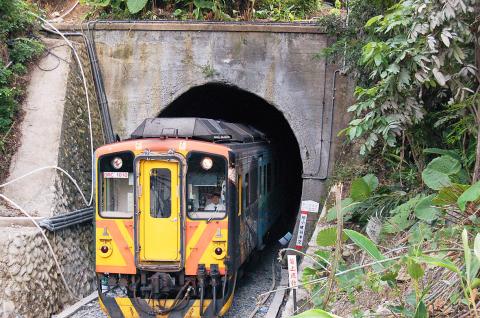The Jiji Line (集集線), one of the nation’s historical railway routes, is scheduled to reopen on Saturday after the service was suspended more than a year ago, the Taiwan Railway Administration said yesterday.
The railway operator also said it would allow free trips on the line for nine days. Those interested in taking rides on the Jiji line must first obtain free one-way trip passes, which are available at the Taichung, Changhua, Yuanlin (員林), Tianjhung (田中) and Ershuei (二水) train stations.
Return tickets are only available at the Jiji and Checheng (車埕) train stations.

Photo: Tseng Hung-ju, Taipei Times
Built during the Japanese colonial era, the 29.7km line was used to transport construction materials needed to build the power plant at Sun Moon Lake. The line runs from Ershuei Station in Changhua County to Checheng Station in Nantou County.
Among the seven tunnels along the route, six have existed for about 80 years. A relatively new tunnel on the line has also been around for 50 years.
The 921 Earthquake in 1999 caused severe damage to the tunnels. The railway operator decided to suspend operations between Longquan (龍泉) and Checheng in March to reinforce them and expand the width of the railway line. During renovation, trains could only operate between Ershuei and Longquan stations.
Taiwan Railway Administration Director-General Frank Fan (范植谷) said that only diesel rail cars could operate on the line in the past. Other types of cars can run on the line now that the reinforcement project is complete.
The railway operator estimates that the project will help raise the capacity of the Jiji Line from 300,000 to 500,000 passengers per year, adding that the nine days of free rides could attract 90,000 passengers.
The railway operator said it had planned to arrange a total of 26 trips per day between Ershuei and Checheng.

Several Chinese Nationalist Party (KMT) officials including Chairman Eric Chu (朱立倫) are to be summoned for questioning and then transferred to prosecutors for holding an illegal assembly in Taipei last night, the Taipei Police said today. Chu and two others hosted an illegal assembly and are to be requested to explain their actions, the Taipei City Police Department's Zhongzheng (中正) First Precinct said, referring to a protest held after Huang Lu Chin-ju (黃呂錦茹), KMT Taipei's chapter director, and several other KMT staffers were questioned for alleged signature forgery in recall petitions against Democratic Progressive Party (DPP) legislators. Taipei prosecutors had filed

Taiwan would welcome the return of Honduras as a diplomatic ally if its next president decides to make such a move, Minister of Foreign Affairs Lin Chia-lung (林佳龍) said yesterday. “Of course, we would welcome Honduras if they want to restore diplomatic ties with Taiwan after their elections,” Lin said at a meeting of the legislature’s Foreign Affairs and National Defense Committee, when asked to comment on statements made by two of the three Honduran presidential candidates during the presidential campaign in the Central American country. Taiwan is paying close attention to the region as a whole in the wake of a

NEW WORLD: Taiwan is pursuing innovative approaches to international relations through economics, trade and values-based diplomacy, the foreign minister said Taiwan would implement a “three-chain strategy” that promotes democratic values in response to US tariffs, Minister of Foreign Affairs Lin Chia-lung (林佳龍) said. Taiwan would aim to create a “global democratic value chain,” seek to capitalize on its position within the first island chain and promote a “non-red supply chain,” Lin was quoted as saying in the ministry’s written report to the Legislative Yuan submitted ahead of the legislature’s Foreign Affairs and National Defense Committee meeting slated for today. The Ministry would also uphold a spirit of mutual beneficial collaboration, maintaining close communication and consultations with Washington to show that Taiwan-US cooperation

Taiwan and the US have begun trade negotiations over tariffs imposed by US President Donald Trump earlier this month, Minister of Foreign Affairs Lin Chia-lung (林佳龍) said in an interview this morning before reporting to the Legislative Yuan’s Foreign Affairs and National Defense Committee. The Taipei Economic and Cultural Representative Office (TECRO), Taiwan’s de facto embassy in the US, has already established communication channels with the US Department of State and the US Trade Representative (USTR), and is engaging in intensive consultations, he said. Points of negotiation include tariffs, non-tariff trade barriers and issues related to investment, procurement and export controls, he